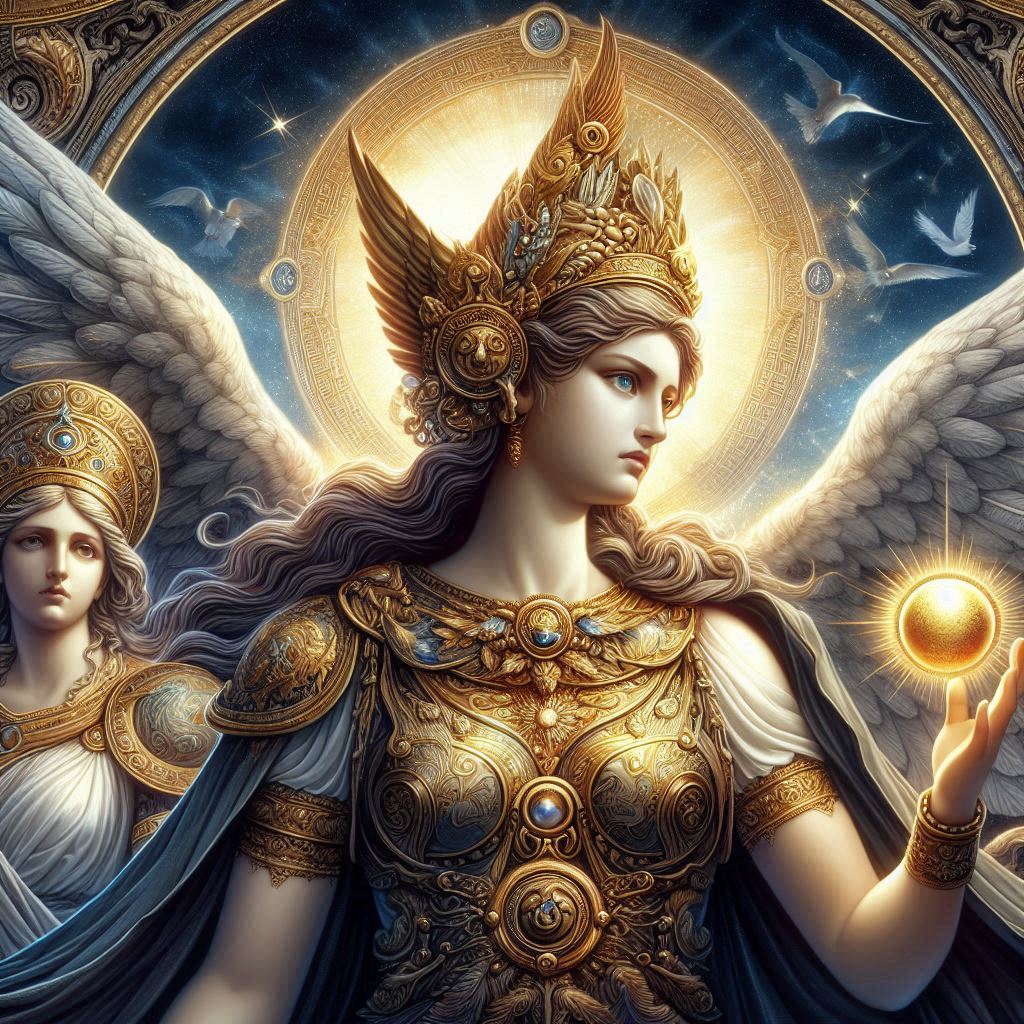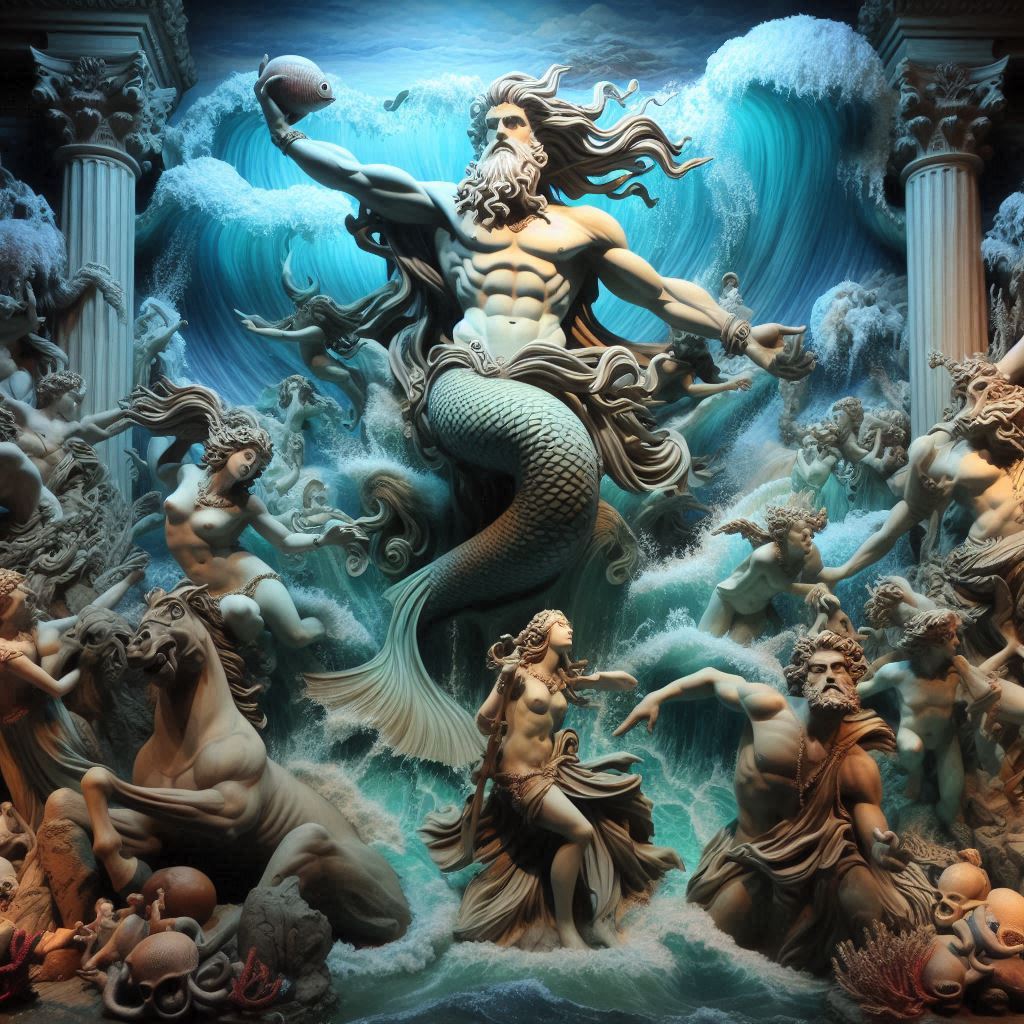In the pantheon of Greek mythology, Athena, the goddess of wisdom, courage, and warfare, occupies a unique and revered position as one of the most formidable and influential deities. Born fully armored from the head of her father Zeus, Athena embodies the embodiment of intellect, strategy, and rational thought, serving as a patroness of heroes, artisans, and the city-state of Athens. Throughout Greek mythology, Athena’s wisdom and guidance play a crucial role in shaping the destinies of gods and mortals alike, offering valuable insights into the nature of wisdom, justice, and the complexities of the human condition.
Athena’s origins are shrouded in myth and legend, with various accounts attributing her birth to different circumstances and divine interventions. In the most well-known version of her birth, Athena emerges fully grown and armed from the head of Zeus, after he swallows her pregnant mother Metis, the goddess of wisdom and craft. This symbolic birth highlights Athena’s association with intellect, creativity, and strategic thinking, as well as her status as a parthenogenetic goddess, born without the need for a mother.
As the goddess of wisdom, Athena possesses unparalleled intellect, insight, and foresight, making her a trusted advisor and counselor to the other gods and mortals. She is often depicted as a strategic thinker, skilled diplomat, and master tactician, offering sage advice and guidance in times of crisis and conflict. Athena’s wisdom extends beyond mere knowledge or intelligence; it encompasses moral virtue, ethical conduct, and a deep understanding of the complexities of human nature.
One of Athena’s most famous attributes is her role as a protector and patroness of the city of Athens, the cultural and intellectual center of ancient Greece. According to myth, Athena and Poseidon, the sea god, competed for the patronage of the city, each offering a gift to its citizens. Poseidon struck the ground with his trident, creating a saltwater spring, while Athena planted an olive tree, symbolizing peace, prosperity, and civilization. The citizens of Athens chose Athena’s gift, thus establishing her as the city’s patron goddess and namesake.
Athena’s association with Athens reflects her role as a guardian of civilization, law, and order, as well as her patronage of the arts, crafts, and intellectual pursuits. The Parthenon, the iconic temple dedicated to Athena on the Acropolis of Athens, serves as a lasting symbol of her influence and reverence in the ancient world, housing a towering statue of the goddess sculpted by the renowned artist Phidias.
In addition to her role as a patroness of cities and civilizations, Athena is also revered as a protector of heroes and warriors, offering her guidance and assistance in times of peril and conflict. She is often depicted as a martial deity, wielding a shield, spear, and helmet, and leading armies into battle with strategic prowess and valor. Athena’s support is sought by heroes such as Perseus, Odysseus, and Heracles, who rely on her wisdom, courage, and divine favor to overcome challenges and fulfill their destinies.
Athena’s wisdom is not limited to matters of warfare and strategy; she is also revered as a patroness of the arts, crafts, and intellectual pursuits. She is credited with inventing various tools and techniques, including the plow, the loom, and the flute, as well as inspiring mortal artisans and craftsmen to excel in their respective fields. Athena’s association with creativity, innovation, and skill underscores her role as a multifaceted deity, guiding humanity in both practical and intellectual endeavors.
One of the most famous myths involving Athena is her contest with Poseidon for patronage of the city of Athens. In this myth, Poseidon and Athena compete to provide the city with the most valuable gift. Poseidon strikes the ground with his trident, creating a saltwater spring, while Athena plants an olive tree, symbolizing peace, prosperity, and civilization. The citizens of Athens choose Athena’s gift, establishing her as the city’s patron goddess and namesake. This myth highlights Athena’s association with wisdom, civilization, and the arts, as well as her role as a protector and benefactor of cities and their inhabitants.
Athena’s wisdom is also exemplified in her role as a mentor and guide to mortal heroes, offering them counsel, support, and divine aid in their quests and endeavors. In the epic poem “The Odyssey,” Athena serves as a guardian and ally to Odysseus, helping him navigate the perils of his journey home from the Trojan War and outwit his adversaries. Athena’s interventions often take the form of strategic advice, disguises, or subtle manipulations of events, showcasing her cunning and resourcefulness as a deity.
Another famous myth involving Athena is her role in the trial of Orestes, a tragic figure from Greek mythology. Orestes is charged with avenging the murder of his father, Agamemnon, by killing his mother, Clytemnestra, and her lover, Aegisthus. Despite the conflicting demands of justice and familial piety, Orestes seeks guidance from Athena, who presides over his trial and ultimately acquits him of guilt. Athena’s decision to absolve Orestes of his crimes demonstrates her commitment to impartial justice and the rule of law, even in the face of conflicting moral imperatives.
Athena’s wisdom is further illustrated in her role as a protector of women, particularly in her defense of the goddesses Artemis and Hestia. In the myth of the attempted rape of Artemis by the mortal hunter Actaeon, Athena intervenes to protect her fellow goddess and punish Actaeon for his transgression. Similarly, in the myth of the attempted seduction of Hestia by the god Priapus, Athena steps in to thwart Priapus’s advances and preserve Hestia’s purity and chastity. These myths highlight Athena’s commitment to upholding the dignity, autonomy, and safety of women in the ancient world.









